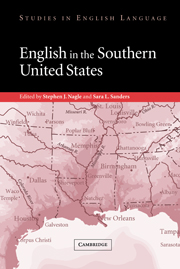Book contents
- Frontmatter
- Contents
- Notes on the contributors
- Acknowledgments
- Introduction
- 1 The origins of Southern American English
- 2 Shakespeare in the coves and hollows? Toward a history of Southern English
- 3 Eight grammatical features of southern United States speech present in early modern London prison narratives
- 4 The shared ancestry of African-American and American-White Southern Englishes: some speculations dictated by history
- 5 The complex grammatical history of African-American and white vernaculars in the South
- 6 Grammatical features of southern speech: yall, might could, and fixin to
- 7 Sounding southern: a look at the phonology of English in the South
- 8 Vowel shifting in the southern states
- 9 Enclave dialect communities in the South
- 10 Urbanization and the evolution of Southern American English
- 11 The Englishes of southern Louisiana
- 12 Features and uses of southern style
- References
- Index
2 - Shakespeare in the coves and hollows? Toward a history of Southern English
Published online by Cambridge University Press: 22 September 2009
- Frontmatter
- Contents
- Notes on the contributors
- Acknowledgments
- Introduction
- 1 The origins of Southern American English
- 2 Shakespeare in the coves and hollows? Toward a history of Southern English
- 3 Eight grammatical features of southern United States speech present in early modern London prison narratives
- 4 The shared ancestry of African-American and American-White Southern Englishes: some speculations dictated by history
- 5 The complex grammatical history of African-American and white vernaculars in the South
- 6 Grammatical features of southern speech: yall, might could, and fixin to
- 7 Sounding southern: a look at the phonology of English in the South
- 8 Vowel shifting in the southern states
- 9 Enclave dialect communities in the South
- 10 Urbanization and the evolution of Southern American English
- 11 The Englishes of southern Louisiana
- 12 Features and uses of southern style
- References
- Index
Summary
Introduction
Within the United States of America, the South clearly is a region which is distinct in many ways – historically, culturally, and also linguistically. The dialect spoken in the southern United States differs from the type of American English spoken elsewhere; it is a variety which most Americans can identify, and towards which strong attitudes prevail, as Preston (1996) has shown. Much has been written about Southern English (cf. the monumental bibliography by McMillan and Montgomery 1989, and recent collections such as Montgomery and Bailey 1986 and Bernstein, Nunnally, and Sabino 1997), and with Lee Pederson's Linguistic Atlas of the Gulf States an extremely rich documentation is available that will keep analysts busy for decades to come (cf. Montgomery's thorough and competent discussion of this source, 1993a). In contrast, relatively little is known about the historical roots and the evolution of this dialect. Some general assumptions and statements have been brought forward, but to a considerable extent these have remained unsupported by linguistic documentation: a history of Southern English remains to be written. In fact, this state of affairs is by no means typical only of Southern English; as Montgomery (1996b) points out, virtually no serious, text-based research has been carried out on colonial American English in general.
- Type
- Chapter
- Information
- English in the Southern United States , pp. 17 - 35Publisher: Cambridge University PressPrint publication year: 2003
- 7
- Cited by



